 Leading Blog | Posts by Month |
 Leading Blog | Posts by Month |
05.31.09

LeadershipNow 140: May 2009 Compilation
Posted by Michael McKinney at 08:42 AM
05.29.09

The How of Innovation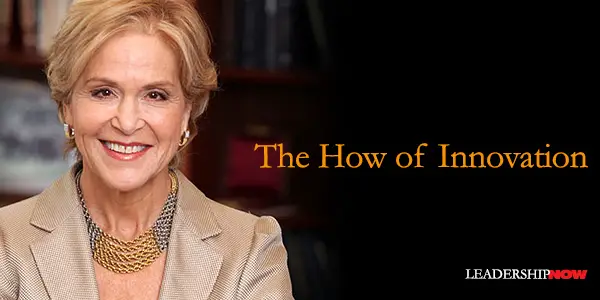
JUDITH RODIN, the then president of the Rockefeller Foundation, delivered a month ago, a thought provoking presentation on the process of innovation and its importance to solving the challenges faced in the 21st century. She believes that innovation is a skill that can be taught. Additionally, believing too, that innovation is not just a product, it’s a process, the Rockefeller Foundation is focusing their funding on the how, not just on the what. Below I have pieced together some excerpts from that speech: Edison was arguably the first modern innovator: not just an early electrical tinkerer, but a systems thinker—a visionary—who recognized that how you innovate is as important as what you invent.
Posted by Michael McKinney at 03:29 PM
05.28.09

Culture Eats Strategy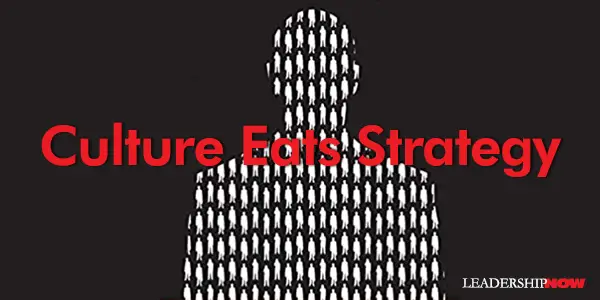
You’re so busy grasping technology in one hand and science in the other, you have no hand left to grasp what’s really important. It’s the human spirit, that’s the challenge, that’s the voice, that’s the expedition.TO create transformation change in an organization you need to change the culture. This may seem to go without saying, but we often try to make changes without changing the underlying belief systems. Belief systems drive behavior. In Transforming Your Leadership Culture, authors John McGuire and Gary Rhodes write, “Organizational culture holds your organization’s aspirations and the spirit of the place. Its beliefs and values define the organization’s core.” To illustrate how endemic the force of belief is within a culture, they relate the following example: Mike, a vice president at National Bank, a prestigious financial organization, tells the story of what came out of an all-day meeting of a group of vice presidents at headquarters: “We brought in VPs and directors from all our locations. We needed to use the largest conference room in the building and had to get special permission to do so.” “Change won’t take hold in operations without change in culture to back it up,” say McGuire and Rhodes. Understanding organizational culture, why it persists, how to change it, and where that change begins is the subject of their book. What beliefs are undermining your change efforts? 
Posted by Michael McKinney at 12:37 PM
05.27.09

Creating a Sustainable Business Environment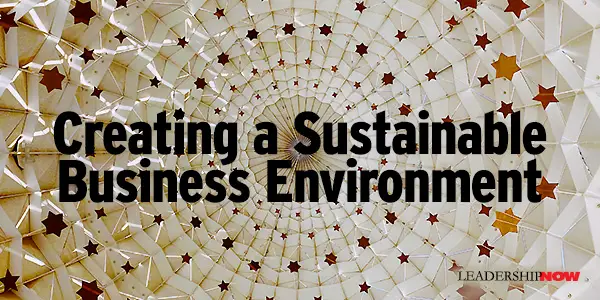
CHARLES HANDY writes that to repair the damage to the image of business, leaders of those businesses should bind themselves to a form of the Hippocratic Oath, “Above all, do no harm.” It means doing more than being legal. It means being ethical. It means taking the lead in creating sustainable environments for both individuals and the world they live in. Lee Cockerell, former executive vice president of operations for Walt Disney World Resort, says that “the organization of the future will pay as much attention to people and leadership strategies as it does to products and services.” He adds that “good leaders are environmentalists: their responsibility is to create a sustainable business environment—that is, one that is calm, clear, crisp, and clean, with no pollution, no toxins, and no waste—in which everyone flourishes.” To that end, leaders must create an inclusive workplace where every employee can contribute to the best of their ability. In The Organization of the Future 2, he suggests ten goals you can set for yourself where you can impact your organization’s culture:
Posted by Michael McKinney at 12:30 AM
05.22.09

The 14 Questions Every Board Member Needs to Ask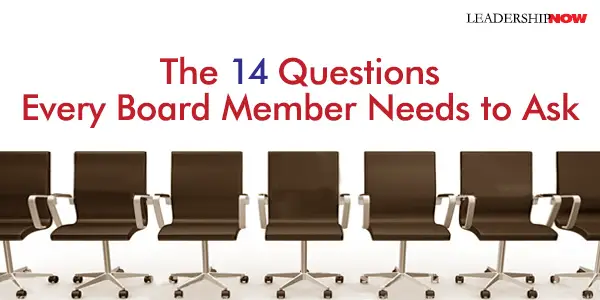
THE question of who’s running the organization is a critical one in this economic environment. Many boards are being asked to do what they were never prepared to do. The challenges and pressures are immense. In a critically important book for directors—Owning Up—world-renowned adviser Ram Charan says the economic downturn is a wake-up call to corporate boards. “Boards need to own up to their own accountability for the performance of the corporation.” Increasingly, "governance now means leadership, not just over-the-shoulder monitoring and passive approvals. Boards must fiercely guard their companies against the threats of rapid decline and sudden demise, while at the same time helping management seize the opportunities that tumultuous change presents but are hard to see in the daily fray of running the business. The board that does both turns governance into a competitive advantage." And all of this without micromanaging. It’s quite a balancing act. [Charan: “Asking questions of an operating nature is not in itself micromanaging, as long as the questions lead to insights about issues like strategy, performance, major investment decisions, key personnel, the choice of goals, or risk assessment.” Why and how is key.] Charan offers fourteen questions that “get to the heart of the unique issues that boards are facing now.” I think the questions are as insightful and provide as much food for thought as the answers they might evoke: Question 1: Is the Composition of the Board Right for the Challenge?
In good times, not enough consideration has been given to question one. Does the board have enough depth of knowledge or experience to ensure the organization stays on track? “Directors as a group must have the specific skills and perspectives needed to carry out their responsibilities.” And these skills must evolve with the times. “If the composition of the board is not appropriate, it is the failure if the [governance] committee. The board must empower the committee to actively shape the board composition.” Bad directors drive out good directors. It’s time for a check-up. Charan’s questions help boards do just that. Additionally, while squarely aimed at directors, Charan’s questions serve a wider audience of leader’s as well. The questions speak to any leader of the need to “own up” to the responsibilities found in their own context. Are we up to the challenge in the area we have chosen to lead? Are we dealing with the issues? Are we trying to identify the issues early and get ahead of them? Are we learning so that we are better able to perform? Are we aware of our impact? All of these questions speak to the need for personal accountability. Addressing Charan’s questions is the way forward. 
Posted by Michael McKinney at 10:03 AM

The Accountability of Boards: A Brief Interview with Ram Charan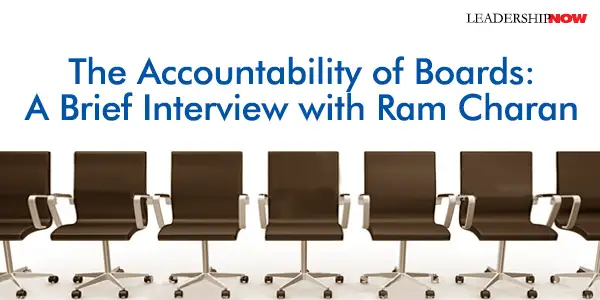
SOMETIMES events in our life serve to remind us of what is important. Recent events have reminded us of the importance of accountability. Not so much holding other people accountable, but in holding ourselves accountable. Leadership is serious business. Are we taking it seriously? Our decisions affect the lives of other people. If we are not qualified to make the right kinds of decisions or are not seeking the advice we need then we can adversely affect the lives of many others. There is no middle ground on accountability. LeadingBlog: As you point out in Owning Up: The 14 Questions Every Board Member Needs to Ask, the expectations and accountability of boards has changed. In that light, the composition of boards needs to be taken seriously. Although it seems to be more of a non-profit sector phenomenon, too often it seems directors placed on boards as a reward or perk or as a favor or condition of some other performance. Have you found this to be an issue and how would you deal with such a politically volatile situation? 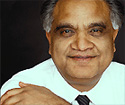 Going forward, you need people on the board who understand business, who have domain knowledge, and are part of a diversified board. Those days of friends, rewards, and perks are almost over, when people were rewarded for favors, personal contacts, or good things in the past. There may be some remnants, but this all has changed. We now have professional outside agencies that systemically evaluate boards, their composition, and attendance, and those evaluations are circulated widely to investors and analysts. Boards need to take it seriously and be accountable. LeadingBlog: Obviously, an organization’s vision—and its strategy for executing it—is critical. You say that the board needs to own the strategy. Just how involved should the board be in determining that strategy and ensuring that it is communicated throughout the organization in a way that it can be articulated and specifically or functionally applied by the people in that organization? Ram Charan: No company can operate successfully without a good strategy. Strategy is proposed by the CEO and his or her team, but in the past, it was proposed, then there was a two-hour and it got approved. Those days are over. Board members want to engage in a discussion of strategy over time, in several iterations, so they understand the competition, the markets, the business model, and the nuances, and through this discussion, they approve the strategy. Anybody who approves it must own it. They don't circulate it. They get the CEO to circulate it and to communicate throughout the iterative process. But boards going forward cannot say strategy belongs to the CEO, not us. That period of lack of accountability is over. 
Posted by Michael McKinney at 10:01 AM
05.21.09

Three Questions Every Leader Should AskRobin Ryde explains in Custom-Built Leadership that there are three questions that will bring clarity to your leadership mandate. They will provide “a personal manifesto for how you will lead. They open up and provide entry to a place where your priorities, personal preferences and ambitions can be properly examined.”How Long Have I Got? This is a question not just about tenure, but the legacy you wish to leave. This will help you to determine your priorities. Your time frame will determine your pace and help you to determine what skills and resources will be of the greatest value to you. How Grand Is My Plan? This question has to do with your ambition and encompasses three key considerations: your appetite for taking on varying degrees of ambition, your freedom to operate, and your inheritance (it’s rare that we inherit positions of leadership as a clean slate). Timing will certainly affect your level of ambition. How Broadly Will I Lead? As a leader you will certainly operate within a system. The question is how far will you travel into the domains that affect your issues that stand outside your formal locus of influence. Ryde pragmatically discusses each of these questions and candidly describes the rewards and pitfalls of the kinds of decisions we make. This book is an important read for anyone taking on a new leadership task or looking to recalibrate the task they are currently in. Ryde writes, “A long-term leadership strategy requires a very different approach to a short-term campaign. Leadership on a grand scale calls upon a different set of skills to a business-as-usual plan. Leaders who wish to influence a broad range of people and institutions need to develop different qualities to those with a narrower engagement plan.”
Posted by Michael McKinney at 01:56 AM
05.15.09

Confusing Principles and Approaches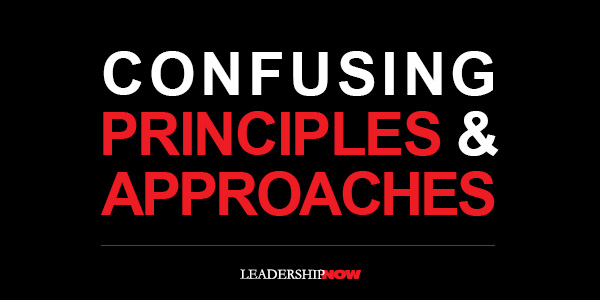
IN How the Mighty Fall, Jim Collins makes a case for why the fall of previously great companies does not negate prior research: The principles in Good to Great were derived primarily from studying specific periods in history when the good-to-great companies showed a substantial transformation into an era of superior performance that lasted fifteen years. The research did not attempt to predict which companies would remain great after their fifteen-year run. Indeed, as this work shows, even the mightiest of companies can self-destruct.Of course, the same is true of the classic by Tom Peters and Bob Waterman, In Search of Excellence. The failure or declining performance of some people and organizations does not negate the basic message. It is part of being human to get ourselves off-course—even when we know better. The failure of the exemplary companies to maintain their hold on greatness or excellence does, however, hold an important lesson for us. It’s all too easy to move away from our core values. They are always under fire and it takes courage to hold the course. Everything we do has to be continually reviewed and realigned to our core values. As you know, knowing the right thing to do and doing it are two different issues. More to the point, doing the right thing once and doing it consistently over time in the face of circumstances that would derail us, is a matter of character. We depart from our core values over time for all kinds of reasons. Doing the right thing doesn’t always give us an immediate payoff in the way we typically gauge success. Doing the right thing is often its own reward. In time, life happens to us and changes our thinking and encourages compromise. Comparing ourselves to others creates doubt. Cynicism is always at the door demanding a hearing and makes sense in a world that rarely works according to plan; a world that is seemingly more irrational than rational. Life changes our friends and they influence us too. All of these circumstances conspire to make us grow or self-destruct. It’s a choice we make every day. This leads us to a cautionary note. In the search for timeless and universal principles that can be applied in any organization, you will frequently find confusion between principles and approaches. Principles are timeless and universal, but approaches are not. Humility is a timeless and universal principle. The Hedgehog Concept is an approach and therefore is not timeless or universal. The approach has been around since recorded time, but is contextual. It will work in some situations and not in others. Approaches change. Principles do not. Principles speak to matters of thinking and behavior that go beyond the moment and to a higher purpose. Approaches are tools. Principles give us meaning. It’s best not to confuse the two.  
Posted by Michael McKinney at 09:02 AM
05.13.09

5 Leadership Lessons: Amp Your Team, Rock Your Business What’s my role in this group? What do I bring to the group that no one else can? How am I contributing to (or detracting from) the success of the group? How much responsibility will I have in keeping the group afloat? Which of my teammates can I learn from, and what can I learn? Related Interest: Sex, Leadership And Rock N' Roll: Leadership Lessons from the Academy of Rock by Peter Cook Cook cites Sydney Pollack on authenticity: You go to leadership school, and try to pitch your voice the same way that the boss did there, and have your office decorated the same way his is, and that’s not real leadership. Real leadership probably has more to do with recognizing your own uniqueness than it does with identifying your similarities.
Posted by Michael McKinney at 10:38 PM
05.12.09

Seth Godin at TEDHere is Seth Godin's talk at TED on the marketing of an idea. It gives a good overview of his book Tribes: We Need You to Lead Us
Posted by Michael McKinney at 12:05 PM
05.11.09

Sebastian Coe On Creating a Winning Culture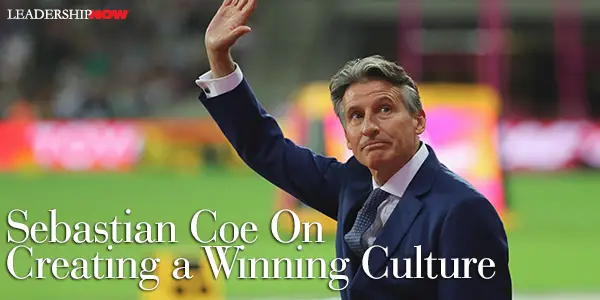
Sebastian Coe, Olympic gold medalist, politician, business leader and chairman of the London Organizing Committee for the 2012 Olympic Games, has written an inspiring book on the mental preparation required for winning in any endeavor. The Winning Mind is a fast-paced collection of life experience that offers evocative insights and expert coaching. Coe believes that leaders are shaped by their “environment, by their ambition, by their role models, by the support they are given as they progress through life and by sheer determination. Our aim must always be that there should be no limit to what an individual from any background can achieve with focus and application — provided they recognize and grab their opportunity with both hands.” Coe says that teams are most productive when they understand the part they play in achieving the final outcome. This requires very clear leadership. “Part of this is ensuring that the work culture is constructive, positive, inclusive and constant.” He offers this advice for creating a winning culture:
How well are you nurturing the conditions necessary to be able to put complete trust in your team? 
Posted by Michael McKinney at 03:27 PM
05.08.09

Your Acknowledgment List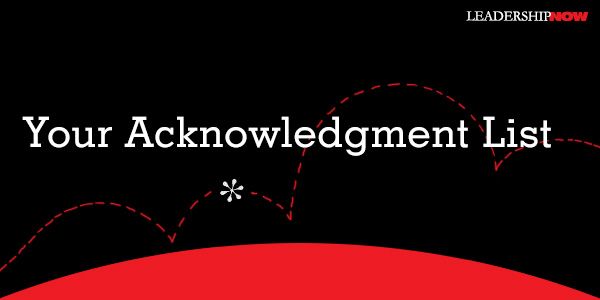
I WANT TO to draw your attention to two closely related posts by Rick Smith. They address two important issues. First, the need to get good, solid support and feedback, and second, the importance of appreciation. Here are some of the key points he shared: Earlier in my career, I was an executive recruiter, and what always struck me is just how lonely these men and women were. Not Tom Hanks on a desert island lonely – these people were surrounded by people clamoring for their attention. Rather, they were lonely in the sense that they rarely if ever could find a safe place to collaborate with peers around real problems. Their superiors were always looking for the answers, their subordinates were looking for direction. When they were able to interact with those outside of their companies, it was almost always at functions for their industry (i.e. their competitors). Everywhere these executives go, that have to present themselves as if they know the answers, as if they are supremely confident. But guess what? Even the most heralded execs share the same uncertainties as the rest of us. They just aren’t allowed to show it. 
Posted by Michael McKinney at 10:31 AM
05.06.09

Ten Leadership Skills You Need For An Uncertain World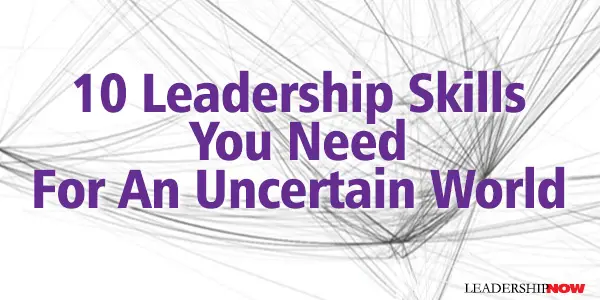
UNCERTAINTY is a part of life. Uncertainty is a call for leadership. Creating clarity from uncertainty is a leader’s stock in trade. Unquestionably some periods of time are more demanding than others. Times like these call on leaders to take a broader view of who and why they are leading and the impact they are having on the world around them. While this is very demanding for any leader, it is also more meaningful. In Leaders Make the Future, futurist Bob Johansen reports that volatility, uncertainty, complexity and ambiguity will only get worse in the future. “Solvable problems will still abound, but top leaders will deal mostly with dilemmas which have no solutions, yet leaders will have to make decisions anyway.” Johansen emphasizes ten leadership skills that will help leaders to cope and thrive in the volatile decade ahead. “We need not passively accept the future. Leaders can and must make a better future.” Although it’s “hard to even think about the future if you are overwhelmed by the present … looking to distant possibilities can provide new insight for the present.” The ten skills he lays out move from the instinctual to the complex and build on each other. Here is a summary of Johansen’s work for you to think on:1. Maker Instinct: The ability to exploit your inner drive to build and grow things, as well as connect with others in the making. Future leaders will need both a can-do and a can-make spirit. The maker instinct is what separates the leaders from the powerless. 2. Clarity: The ability to see through messes and contradictions to a future that others cannot see. Leaders are very clear about what they are making, but very flexible about how it gets made. How can you as a leader, create and communicate with clarity in confusing times – without being simplistic? 3. Dilemma Flipping: The ability to turn dilemmas – which, unlike problems, cannot be solved – into advantages and opportunities. We must be able to nurture the ability to engage with hopelessness, learn how to wade through it to the other side, and flip it in a more positive direction. Think Roger Martin’s concept of the “opposable mind.” How can you remake a situation with no solution? 4. Immersive Learning Ability: The ability to immerse yourself in unfamiliar environments; to learn from them in a first-person way. Immersive learning requires active attention, the ability to listen and filter, and to see patterns while staying centered – even when overwhelmed with stimuli. Leaders can’t absorb everything, so they must filter out extraneous information and learn how to recognize patterns as they are emerging. 5. Bio-Empathy: The ability to see things from nature’s point of view; to understand, respect, and learn from nature’s patterns. It is big-picture thinking that respects all the multiple interrelated parts and nonlinear relationships, as well as cycles of change. 6. Constructive Depolarizing: The ability to calm tense situations where differences dominate and communication has broken down – and bring people from divergent cultures toward constructive engagement. The next decade will be characterized by diversity and polarization. The temptation is to pick sides, but that is rarely a good strategy. 7. Quiet Transparency: The ability to be open and authentic about what matters to you – without advertising yourself. This begins with humility. Leaders who advertise themselves and take credit for their own performances will become targets. Are you self-promoting? 8. Rapid Prototyping: The ability to create quick early versions of innovations, with the expectation that later success will require early failures. Fail early, fail often, and fail cheaply. Accept failures as important ingredients to success and learn from them. 9. Smart Mob Organizing: The ability to create, engage with, and nurture purposeful business or social change networks through intelligent use of electronic and other media. Leaders are what they can organize. Can you organize smart mobs using a range of media? 10. Commons Creating: The ability to seed, nurture, and grow shared assets that can benefit other players – and sometimes allow competition at a higher level. Can you create commons within which both cooperation and competition may occur? 
Posted by Michael McKinney at 09:30 AM
05.05.09

Newswire: Making Management a True Profession
Posted by Michael McKinney at 01:07 PM

The Four Roles of MentorsIn The Element: How Finding Your Passion Changes Everything, Ken Robinson writes that mentors serve us in one or all of the following ways:Recognition. “I don’t know of any test or software program that can make the kinds of subtle, personal distinctions that differentiate an interest from a burning passion. A mentor who has already found the Element in a particular discipline can do precisely that. Mentors recognize the spark of interest or delight and can help an individual drill down to the specific components of the discipline that match that individual’s capacity and passion.” Encouragement. “Mentors lead us to believe that we can achieve something that seemed improbable or impossible to us before we meant them.” Facilitating. “Mentors can help lead us toward our Element by offering us advice and techniques, paving the way for us, and even allowing us to falter a bit while standing by to help us recover and learn from our mistakes.” Stretching. “Effective mentors push us past what we see as our limits. Much as they don’t allow us to succumb to self-doubt, the also prevent us from doing less with our lives than we can.”
Posted by Michael McKinney at 09:49 AM
05.04.09

Find Your Tribe. Find Your Passion.Ken Robinson calls the place where the things we love to do and the things we are good at come together, the Element. Illustrated by stories, many based on exclusive interviews, of celebrities, entrepreneurs, scientists, and other highly accomplished people who have found the Element, Robinson’s book The Element: How Finding Your Passion Changes Everything is an engaging and motivating resource.Connecting with people who share our same passions and commitment helps in developing our Element. This is our tribe. “Often we need other people to help us recognize our real talents. Often we can help other people to discover theirs.” Robinson says that for many people, finding your tribe is essential in helping you to find your Element. “Finding your tribe can have transformative effects on your sense of identity and purpose. This is because of three powerful tribal dynamics: validation, inspiration, and what we’ll call here the ‘alchemy of synergy.’” Validation: It’s not just me. Although you may be most in your element when you are working alone, “there’s a tacit awareness of a field – the other writers, other painters, other mathematicians, other players, who enrich the domain and challenge their sense of possibility.” Physicist John wheeler said, “If you don’t kick things around with people, you are out of it. Nobody, I always say, can be anybody without somebody being around.” Inspiration: How do they do that? “Members of a passionate community tend to drive each other to explore the real extent of their talents…. Tribes are circles of influence, and they can take many forms…. When tribes gather in the same place, the opportunities for mutual inspiration can become intense.” Alchemy of synergy: The power of tribes is exemplified in the synergy created when groups of people with similar interests come together and create something much greater than any one of them could create individually. Robinson attributes this to the fact that creative teams are diverse, dynamic and distinct or purposeful. Robinson says that tribe membership “helps people become more themselves, leading them toward a greater sense of personal identity.” Finding your Element is not always easy. Fear is the most common obstacle standing between you and your passion. “These fears include the fear of failure, the fear of not being good enough, the fear of being found wanting, the fear of disapproval, the fear of poverty, and the fear of the unknown. You may also find that your background has never given you the opportunity to discover or explore your Element in the first place. You also have to face the impact of the image and expectations that other have of you have of you that put pressure on you to pursue a different path. If you are looking to find or develop your passion – your Element – Robinson’s book is a carefully reasoned and practical guide to help you find the best in you. At the very least, it will make you think differently about yourself.
Posted by Michael McKinney at 11:26 PM
05.01.09

First Look: Leadership Books for May 2009Here's a look at some of the best leadership books to be released in May.




For bulk orders call 1-800-423-8273
Posted by Michael McKinney at 01:46 AM
|
BUILD YOUR KNOWLEDGE


How to Do Your Start-Up Right STRAIGHT TALK FOR START-UPS 
Grow Your Leadership Skills NEW AND UPCOMING LEADERSHIP BOOKS 
Leadership Minute BITE-SIZE CONCEPTS YOU CAN CHEW ON 
Classic Leadership Books BOOKS TO READ BEFORE YOU LEAD |
|